Islamist threat to Britain is at an ‘unprecedented level’ amid Gaza war, with calls by the public to anti-terrorism hotline DOUBLING amid fears Hamas propaganda could ‘energise’ jihadis, Met chief warns
Britain is facing an 'unprecedented level' of counter-terrorism arrests as people are 'pushed' towards extremism during the war in Gaza.
Deputy Commissioner Matt Jukes, who heads the country's counter-terrorism police force, has warned that Hamas's October 7 atrocities had increased the danger of an attack on London.
He told MPs that there have been more terrorism arrests in the past two months than in all of last year, indicating a “worrisome environment in which people are becoming energized by possible support for extremist ideologies.”
The number of calls from the public to the anti-terrorism hotline has doubled, while tthis also includes a 12-fold increase in references to extremism online and a 25 percent increase in counter-terrorism intelligence.
MPs were warned that police counter-terrorism resources are under enormous pressure as they face the 'greatest confluence of threats' since the 2012 London Olympics.
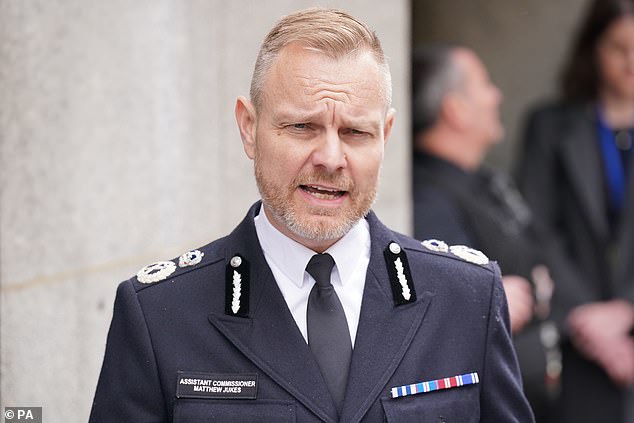
Deputy Commissioner Matt Jukes (pictured) has warned that Hamas atrocities on October 7 have increased the danger of an attack on London
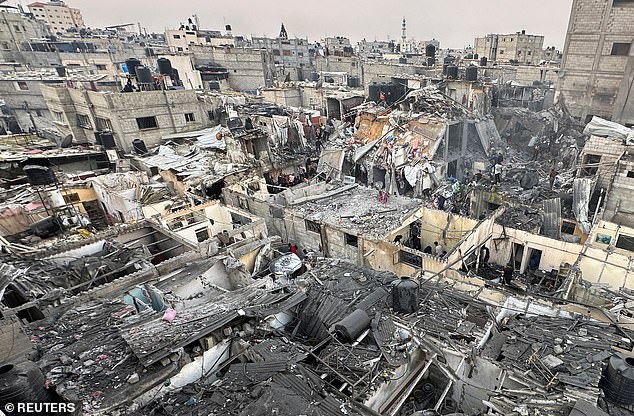
People search through the rubble of damaged buildings after an Israeli airstrike on Palestinian homes, amid the conflict between Israel and Hamas
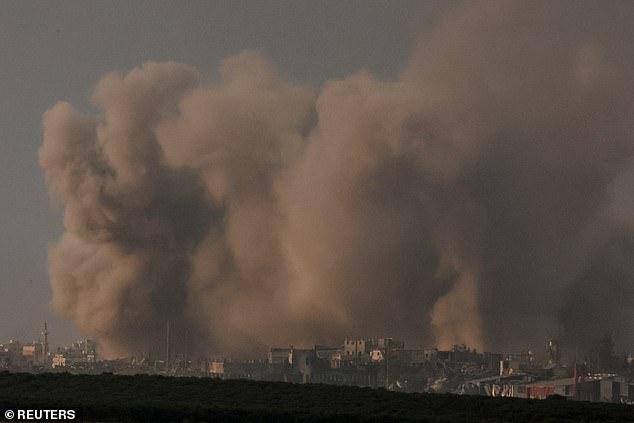
Smoke rises over Gaza, as seen from southern Israel, amid the ongoing conflict
Across England and Wales, there has been a 680 percent increase in anti-Semitic crimes and a 140 percent increase in reported Islamophobic crimes, while 500 investigations have been conducted for alleged breaches of terrorism legislation.
The Met has dedicated 28,000 officer shifts to police protests since October, at a cost of £17 million in London alone.
Nationally, officers have had to tackle 900 protests in the past two months.
Responding to the shocking statistics, Mr Jukes told the Commons Home Affairs Select Committee: 'There are states or parts of states that are fueling some of the division, the polarization that we have seen, especially with online communications.'
He said he is also concerned about the continued harassment of British MPs and “anti-democratic” protests outside their homes.
Since September, crimes linked to attacking MPs have doubled, as politicians have been attacked for their views on the conflict.
“This is an exceptional period when we have an immediate sense of counter-terrorism risks,” Jukes told MPs.
“We have seen a whole spectrum of behavior over the course of the protests, the extremes of which spill over into terrorism legislation.
“Arrests for crimes related to supporting or glorifying terrorism are in unprecedented numbers compared to the past decade and are part of a worrying environment in which people are becoming energized by possible support for extremist ideologies.”
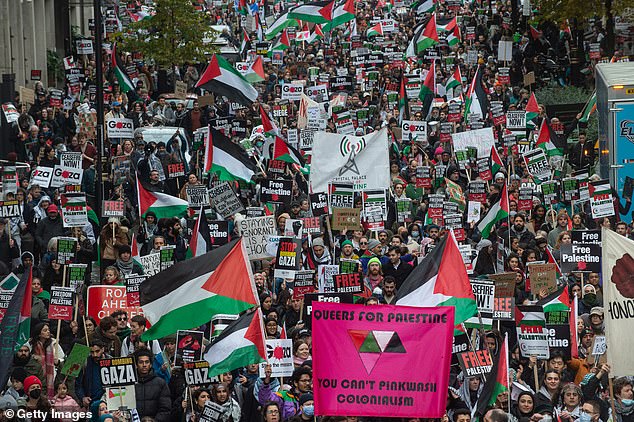
Thousands of protesters marched from Bank Junction to Westminster on Saturday, many holding signs reading 'Free Palestine' and 'End the siege'.
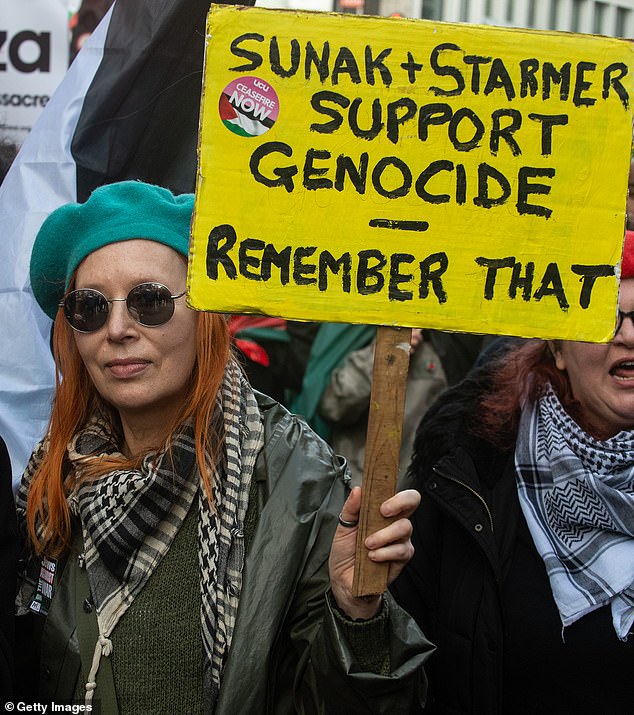
A woman holding a sign accusing Prime Minister Rishi Sunak and Labor leader Keir Starmer of 'supporting genocide' is pictured marching through Westminster
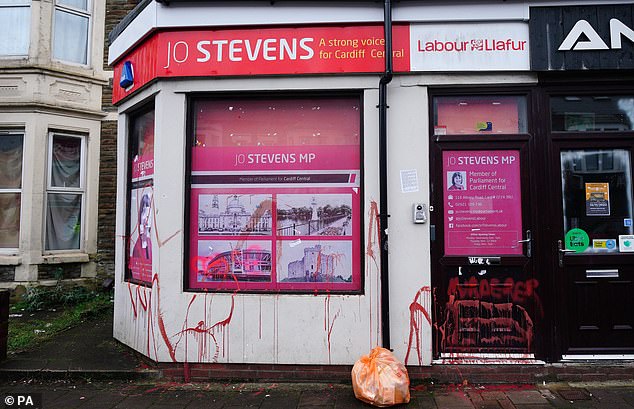
Shadow Welsh secretary Jo Stevens' office in Cardiff was covered in red paint and posters accusing her of having 'blood' on her hands after she failed to vote for a Gaza ceasefire in November
He added: “The threat will manifest itself at two speeds. We see people becoming energized or irritated by the amount of hateful material in circulation. There is a real risk, as we saw recently in Paris, that an individual will be energized by these events.
“The FBI director talked last week about flashing red lights everywhere and I think that's part of what we're starting to see: that increase in calls from the public, that increase in online traffic and more and more young people getting involved are.'
Mr Jukes fears that graphic images from the conflict are being used by terror groups as a recruitment tool to lure impressionable British teenagers.
The Counter-Terrorism Internet Referral Unit has received 2,100 reports since the Hamas attack on October 7, the highest number of referrals the unit has ever received since it was founded in 2010 to remove terrorist material online.
Mr Jukes' colleague, Met Deputy Commissioner Matt Twist, told the hearing: 'What we are seeing in London is the biggest convergence of threats we have seen for a very long time, with the impact of major global events being felt in the streets of London. .
'The scale of the challenge for the police is enormous.'
Mr Twist added: “I am concerned about the impact of social media. “Some of what we're seeing is very clearly designed to stoke division, fuel polarization and make things worse.”
Later, Dame Sara Khan, the Home Office's former extremist tsar, told the committee that Britain's lax laws had given Hamas supporters the freedom to glorify terrorism.
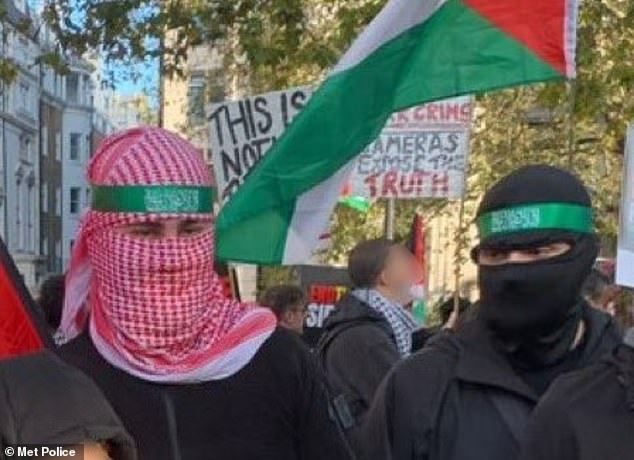
Two men pictured wearing alleged Hamas-style headbands, their balaclavas and scarf-covered faces during a protest in London on November 11
She said it is not illegal for extremists to celebrate the Hamas attacks on Israel, as long as they avoid specifically encouraging a terrorist act and refrain from directly supporting the banned organization.
Ms Khan, who is now an independent adviser on social cohesion to Michael Gove, called for new laws to tackle hateful extremism and said it was 'quite shocking' that neo-Nazi and Islamist groups could preach hatred without fear of arrest because of Britain's 'tolerant environment'.
Lord Walney, the government's independent adviser on political violence and disruption, also told the committee that consideration should be given to whether existing legislation could be used to curtail ongoing pro-Palestinian protests.
